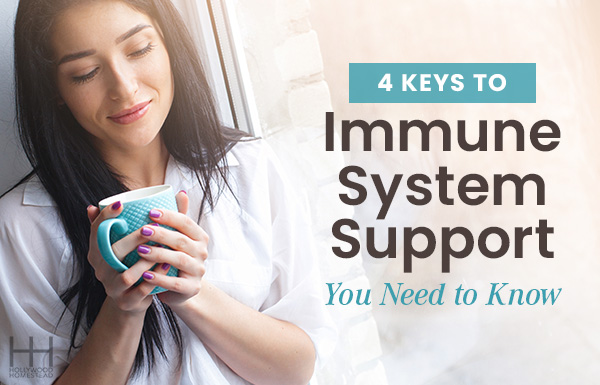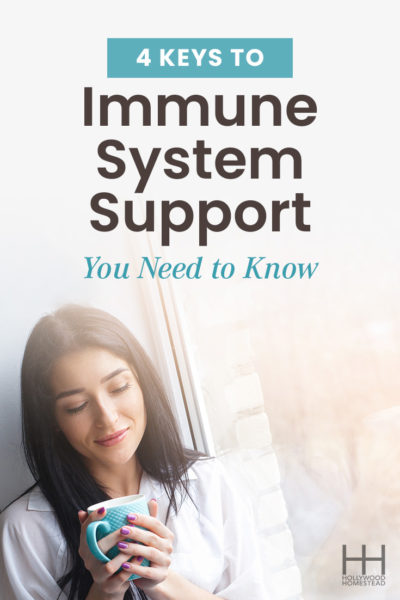
Toilet paper and hand sanitizer are flying off the shelves, restaurants are shutting down until further notice, and “social distancing” is the new phrase in everyone’s vocabulary. There’s a pervading sense of helplessness and mild panic in the air – but there’s still a lot in your control. And now, more than ever, your immune system is relying on you.
While we can’t do much about restocking the stores with toilet paper, there is a lot you can do to keep your immune system going strong right now. Let’s talk about a few of the simple ways you can support your immune response and keep your body functioning at its best.
Stress Less
I’m not gonna sugar coat it: things have been getting a little crazy lately! It’s easy to just say “keep calm and carry on” but the truth is, it’s natural to feel some stress and anxiety right now.
While we can’t completely control our emotional response to how events are unfolding, we can use some coping strategies that keep stress from taking over our lives. Your immune system is counting on it!
Stress raises cortisol levels and actually suppresses the immune system, so reducing stress and coping with it in a healthy way is vital. (source)
Simple practices like deep breathing and meditation are very powerful and have been shown to activate the immune system. They work by reducing stress, decreasing inflammation, and promoting the body’s natural healing response. (source)
So take a deep breath, accept that things are going to be off kilter for a while, and then add some stress-busting practices like meditation to your routine.
Learn more ways to reduce stress in my post here.
Staying Home
I’ll admit: I’ve never heard of “social distancing” until the last couple of weeks. Honestly, some of us introverts just call it “how I normally live.” Jokes aside, this is one of the most impactful ways you can help yourself (and others) right now.
I’m not extremely worried about myself or my kids – we are healthy and have strong immune systems. But I live in a community with a large retired population and I know many people with autoimmune conditions that leave them vulnerable to viruses that don’t phase most of us.
And this is why staying home as much as possible is near the top of my list. By limiting contact with others (especially in large gatherings or indoor crowds), we can protect the most vulnerable members in our society by controlling the spread of illness.
Who is most vulnerable?
The list includes people who:
- are over age 70
- are pregnant
- have asthma or other respiratory conditions
- have chronic heart/liver/kidney disease
- have chronic neurological conditions
- have a compromised immune system (due to cancer treatment, other health conditions, etc.)
- are diabetic
- have cerebral palsy
Do Reach Out
While it’s important to avoid physical contact when possible, be sure to check in on vulnerable people you know by phone or over social media to see how they’re doing. They may need food or medical supplies delivered, or simply a kind conversation if they’re feeling isolated.
Read more about how social distancing works here.
Sleep
One of the most important things you can do for your immune system right now is also one of the simplest: sleep.
Lack of sleep literally weakens your immune system. When you don’t get enough sleep, your body produces fewer cytokines, proteins that target infections and inflammation. This has a huge impact on the strength of your immune system. (source)
Toddler is the New Black
When in doubt, sleep like a toddler: give yourself an early bedtime (before 9pm if you can swing it) and take an afternoon nap if you need to make up for lost hours.
Ideally, you should get 7-9 hours of sleep at night. If you can’t quite manage that, research shows that two 30-minute naps can reduce stress and give your immune system a boost. (source)
Need some help getting to sleep at night? Read my post on 7 natural sleep aids (that aren’t melatonin).
Supportive Nutrients
Now that you’re prioritizing sleep, staying home as much as you can, and reducing stress where possible – it’s time to talk supplements.
Specific nutrients can help boost the immune system and provide that extra defense when you need it. Here are the nutrients and supplements I’m using most right now:
Vitamin D
A deficiency in vitamin D is linked to a weaker immune system (source). I always like to make sure my vitamin D levels are up to par – you can use this vitamin D at-home test to see where you stand.
Always check your labels to make sure you are getting vitamin D3 (the D2 version is low quality and not effective). This is my favorite high-potency Vitamin D supplement.
(Note: check with your doctor before using high potency supplements.)
Liposomal Vitamin C
Vitamin C is well known for its immune support capabilities. And it’s most effective when you take vitamin C before you feel sick. (source)
The problem? Vitamin C can cause digestive distress and loose stools when taken in large doses. Avoid this side effect by using liposomal vitamin C, which is easily absorbed and gentle on your digestive system.
This is my favorite Liposomal Vitamin C supplement.
Colloidal Silver
You’ve probably heard of colloidal silver – it’s a popular natural remedy that everyone should have ready in case they need it.
For 500ppm colloidal silver, adults should take one half teaspoon once per day for 10-14 days to support the immune system. You can dilute it in a mix of 50/50 juice and water to make it more palatable.
Colloidal silver is very powerful and is only meant to be taken in the short-term, so don’t take more than the recommended dose for a maximum of 14 days. (Double check the directions on your bottle of colloidal silver to make sure you use it properly.)
This brand of colloidal silver is highly rated and currently in stock.
Lauracidin
Lauracidin is the supplemental form of monolaurin, a compound derived from lauric acid and glycerin. It’s a natural byproduct of coconut fat (and is what makes coconut oil so awesome!).
Monolaurin has extremely powerful antimicrobial and antiviral properties. (source)
Lauracidin powder is easy to take and is especially beneficial for those with suppressed immunity and those in the vulnerable categories.
I recommend this lauracidin powder supplement if you need extra support.
Bone Broth
Nourishing foods help build the foundation for a healthy immune system, and bone broth is probably the most important food you can be eating right now.
Bone broth helps heal the gut (a critical part of your immune system) and also has anti-inflammatory properties that support immune health. I recommend drinking 1-2 cups of bone broth daily as a protective measure even when you feel well.
Learn how to make your own bone broth here.
If you’d like to order ready-made bone broth, I highly recommend this brand for the best quality.
Allimed
Allicin is the sulfur compound that gives garlic its fame as a natural immune booster. Research shows that garlic compounds like allicin enhance the immune response (called immunomodulation) by stimulating certain cell types like lymphocytes and by activating macrophages, among other important effects. (source)
But… garlic compounds are notoriously unstable and you need stabilized allicin to get the full benefits for your immune system, which is why I only recommend the stabilized allicin supplement Allimed.
How to Test for COVID-19 and Antibodies
How do you know if you’re already immune to COVID-19? There are two key steps to find out exactly where you stand:
1. First, test to see if you are currently a carrier of the virus.
2. Then, test to see if your body has developed antibodies to the virus.
How to Test if You’re Currently a Carrier
For safety reasons, it’s very important to test to see if you’re currently a carrier of COVID-19. Remember, you can be a carrier even if you’ve had no symptoms at all.
To keep yourself and your loved ones safe, test for the live virus first. How do you test if you’re a carrier? This can only be tested with the PCR nasal swab test.
You can order the nasal swab test here.
How to Test if You Have Antibodies for COVID-19
Next, you want to know if your body has already had a chance to fight off the virus and establish antibodies. To do this, you need to use the ImmunoBlot + Antibody test kit here.
Immunoblotting is an advanced technique that reduces the rate of false positives and gives the most accurate results.
Again, you may have already been exposed to the virus even if you’ve had no symptoms or were only mildly ill. So you want to take the antibodies test in any case to establish if you have immunity to the virus.
For Best Results, Take Both Tests
Use the ImmunoBlot test in combination with the PCR nasal swab test to give the most accurate picture of what’s going on with your immune system. That way, you can make the best decisions for the safety of yourself and your family.
Note: for the ImmunoBlot test, you will need to locate a local draw center that will draw blood to test for COVID-19 antibodies. Call ahead to verify this can be done.
Order the ImmunoBlot + Antibody Test Kit.
Order the PCR Nasal Swab Test Kit.
Conclusion
What steps are you taking to support your immune system? Do you have any favorite supplements or tips for staying healthy when there’s a virus going around? Share your thoughts in the comments!

Latest posts by Sylvie McCracken (see all)
- Treating H. Pylori (Part 3): What H. Pylori Does to the Body - August 8, 2022
- Treating H. Pylori (Part 2): How H. Pylori is Contracted - August 3, 2022
- Understanding Beef Labels: Organic, Pastured, Grass-Fed & Grain-Finished - July 25, 2022